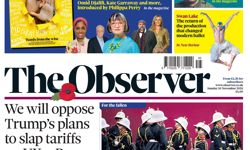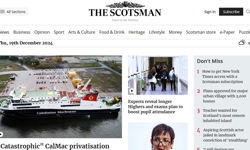Three years ago, James Murdoch, then chief executive of News International, suddenly asked Mike Darcey, chief operating officer of BSkyB, whether he thought newspapers had a future.
Darcey, who had worked at the satellite broadcaster for 15 years and had no experience of newspapers whatsoever, was startled by the question but when he got over his surprise, gave an immediate, instinctive answer.
“I don’t know about newspapers but I think that paid-for professional, curated, branded, journalism has a future whether we print it on dead trees or distribute it in other ways, or a mixed ecology,” Darcey remembers replying.
The fundamental error
He had another instinctive thought as a newspaper outsider but a specialist in pay television – that the industry had made a tragic error when it reacted to the rise of the internet by thinking it should put all its content online for free.
Four years on, and with the benefit of nine months’ experience running News UK, the renamed News International, Darcey thinks exactly what he did when he delivered his impromptu analysis to James Murdoch. The only thing that has changed is that he has now become “more and more convinced” about the error of giving online content away free at the same time as trying to sell paid-for print newspapers.
“It was a fundamental error and the industry is trying to back-peddle from that as best it can,” says the 48-year old Darcey who was an economic advisor specialising in entertainment and telecommunications before joining Sky.
As he talks about the challenges facing the newspaper industry, unsurprisingly he harks back to his pay television experience.
There is a perfectly respectable free-to-air television business in the UK, which includes ITV, Channel 4 and the satellite business Freeview.
“If I am going to run a pay TV business against that background, you can’t make Sky a pay business and stick it on Freeview as well. Why would I do that? It’s obvious you have to chose, you have to decide,” argues Darcey.
The argument, he believes, is just the same for the Sun. On one side, there are 2.3 million people paying for the paper every day. Over there, the paper’s content was being given away free in pursuit of additional online advertising revenue, and in the hope that somehow those who pay won’t notice.
“Maybe that was a plausible idea some time ago – though I don’t think so – but it isn’t now,” the News UK chief executive insists with passion over a breakfast bacon butty at The Delaunay in central London.
You can almost hear those who think free online newspaper content combined with paid-for sales has some business merit being told off like errant students.
“The only way you could have believed that was a sustainable position was if you believed there were two quite distinct populations and nothing would cross between them,” says Darcey.
The people who bought newspapers would have to be a certain type of person distinct from the savvy people who know about the internet - and never the twain would meet.
“That”, says Darcey pointing at his smartphone, “kills it (the argument) absolutely stone dead because it is a democratic device that sits in both those populations. Everyone will have one. We carry the internet, we have connectivity all over the place and there are not two separate populations,” explains Darcey who is also never far away from his iPad.
The suggestion that there might be an argument in favour of a hybrid solution, with some free content to maintain a wider presence and for promotion and sampling, is swatted away with equal vigour.
After much deliberation, they decided against such a policy at Sky. The difficulty of running a “Sky Light” on Freeview always stood in the way. Offer a decent channel and it could become a perfectly acceptable substitute for the pay version. Tone it down and it would have little impact and would be a poor advertisement anyway.
“The argument in the newspaper world is even more clear-cut to me. The idea that you have to give it away free so that people can sample is frankly quite absurd. You can sample the Sun for 40p,” says Darcey who is equally robust about the loss of online impact a publication inevitably suffers when it goes behind a paywall.
“If your objective function is to run a sustainably profitable business model then you haven’t really lost anything (by going behind a paywall),” says Darcey who questions the quality and value of free online digital reach.
“It’s probably not making any money and might be losing money and it’s undermining the piece of your business that is making money. Every week, every month, people are waking up and saying, why am I paying for this,” suggests Darcey who used to be a competitive gymnast and who now surfs, skis and snow boards.
Football rights
As he talks, it doesn’t take long to realise why Rupert Murdoch chose Mike Darcey, a pay TV executive with no newspaper experience, to run two national newspapers already behind a paywall and take the third – the Sun - in the same direction.
As he turned up for work one morning in November, Darcey was warned by his boss at BSkyB, Jeremy Darroch, that Rupert was about to call and that he was going to be offered something else. A vacancy was opening up because the chief executive of News International, Tom Mockridge, who now runs Virgin Media, was resigning. It came in the wake of Robert Thomson taking over the top job in News Corporation following the split of the company into television and largely publishing based entities.
When the call came, Darcey emphasised the obvious – that he had no newspaper experience. Murdoch said it would be fine. After all, he did know about content, subscription, video, rights, in fact all the things that were becoming more important in the world of newspapers.
Later that week, and before the appointment had been announced, in his first meeting with Thomson and Murdoch in New York, the idea of buying rights to Premier League goals and highlights for online and mobile came up.
Darcey knew that ESPN had the mobile rights and Yahoo held the internet rights but that the League planned to combine the two and auction them. Darcey, who had been involved in five rounds of nerve-tangling blind auctions for the main Premiership television rights for Sky, won the package for News UK.
He still has no idea who the other bidders were but he is pretty sure no other newspaper groups were involved.
“Many of them have since said, what happened there? Why weren’t we thinking about this? We have certainly posed a lot of questions to other people,” says Darcey who has now added video clips of England and FA Cup matches from next year for his titles.
If you are selling a pay proposition, then the News UK chief executive believes you have to find as many ways as possible to be “distinctive and differentiated” and pockets of exclusive sports video rights can help.
Already, subscribers can read a Premiership match report in the digital edition of the Sunday Times and then click to see the goals.
You have to wait until packages of rights become available but it is unlikely that Darcey will stop at football.
Print or digital? Let readers decide
Despite the emphasis on new opportunities, Darcey, the former television man, says he doesn’t see the Times “not being available in print in any foreseeable future and that is not something I am trying to make happen.”
The job of newspaper publishers, he believes, is to create great products for the different distribution environments and let consumers decide where they want to be.
“I want to let the customer make the right choice. I will look at the evidence but I really think print is around for a long time to come,” he says.
The future of print generally will, however, be a mixed bag depending on the decisions publishers take.
“I am very happy, funnily enough, with what we are doing. I think there has been a big hole in the bucket and I think it has been self-created to a large degree by giving away the same content for free. We fixed the hole in the bucket three years ago,” says Darcey who is now happy to be judged on total paid sales – print and digital. The company has not recently said what that number is – only that the total is rising.
He believes that papers like the Guardian are eating themselves alive by publishing a newspaper at £1.40 and then giving all the content away for free.
“It’s hard to predict where that ends. I really don’t know but I don’t think it ends well,” Darcey adds.
As for the Daily Mail, the Mirror and the Daily Telegraph, they are all in slightly different places, all starting to grapple with the free / paid-for issue.
“If they have strong, free, online propositions, then I think they are contributing to a decline in their print sales and really it’s a function of the decisions they make and whether they tighten that up or whether they continue to eat themselves alive,” Darcey adds.
The executive believes it is “barmy” to elevate print sales over other forms of distribution and to talk about declining print sales in isolation.
“We want people to pay for our content. People have a great relationship with the Times and if they do it via a paper, great, but if they do it via a tablet, I really don’t mind,” Darcey says.
The creation of two quoted companies from the old News Corp, he says, was largely driven by US shareholders who wanted to invest in television rather than newspapers. Such sentiments obviously became much stronger after the phone-hacking scandal.
But newspapers remain Murdoch’s first love and he still calls regularly – sometimes daily - to discuss how the business is going.
Legacy issues
Apart from just running the company, Darcey has to cope with everything from the apparent stand-off with the independent national directors of the Times, the aftermath of Leveson and the process of prosecutions of those accused of being involved in phone-hacking and making illegal payments to officials.
The papers, he says, are doing well with their “acting editors” and he insists it makes business sense to keep the Times and the Sunday Times as distinct titles.
“I think there was some worry early on (about a merger) but I have no such plans because I don’t think it would be a good idea. And if we did, we recognise you would have to go to the Government who might block it anyway, so it’s a bit of a non-issue,” says Darcey.
On Leveson, the News UK executive fully supports the industry-inspired Royal Charter proposal. It is comprehensive, addresses the issues that have gone wrong in the past and most publishers are willing to sign up to it.
He finds it difficult to understand the position of the Guardian which has “changed its mind most weeks”.
Are you going to be unregulated, “unless you are going to be the only publisher regulated by the state system? Best of luck with that,” he points out.
On the arrests and coming trials, Darcey says there are good days when charges are dropped and other days when executives are totally occupied with things “that relate to our past” and the trials due to begin in the autumn.
He sees it as a headwind slowing the recent momentum in the business.
“The headwind makes it a bit more difficult but it is not so strong that it stops us in our tracks,” says Darcey.
The past will continue to haunt the company for several years to come but for the future, Mike Darcey insists that there is now no media organisation in the world that is governed more comprehensively than News UK.












